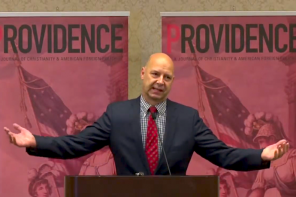Octavia Nasr, CNN’s senior Middle East editor, is no longer with CNN. Her departure from CNN shows a continued lack of consistency when it comes to issues of Arabs and Muslims in the mainstream media.
She left for a tweet that said nothing except that she was human. Nasr is of Lebanese descent and proud of her birth land. Because of her professional and personal knowledge of the country, she expressed a sentiment over the death of Marja’ at-Taqlid (Grand Ayatollah)Mohammed Hussein Fadlallah. Her sentiment, from a deleted Tweet, was “Sad to hear of the passing of Sayyed Mohammed Hussein Fadlallah . . . . One of Hezbollah’s giants I respect a lot.”
According to a later blog post, she said she admired him because of his statements for women’s rights. She rightfully acknowledged that the Tweet is not the best format for expressing complex thoughts.
For example, were I to Tweet “Sad to hear of the passing of R. Reagan … One of the Republican’s giants I respect a lot,” no one would think I support Republicanism in any of its modern incarnations, because of the totality of my work. I can say that Reagan was an amazing orator, or acknowledge how he gave the country hope. That does not meant that I agree with his social or economic policies.
However, the entire corpus of Nasr’s work was not considered. Anyone who has followed her work on CNN, or her Twitter stream, would immediately recognize that she does not support Hezbollah’s militant wing in anyway. It is also important to note that Hezbollah is actually a democratically elected party in Lebanon, with which the US government deals with on a regular basis.
Unfortunately, CNN fell into pattern and abandoned one of their reporters instead of standing up for her. Initially, CNN even refused toexplain what Nasr had done wrong, quoting a super-secret social media policy that even they are not fully aware of. Eventually, the decision was made that their reporters in America are not as free as American clients in Iraq, where the Prime Minister expressed his admiration, or Jordan, where the King expressed his.
Interestingly, even the Israeli press lauded Fadlallah. There is also an important point to keep in mind regarding Fadlallah’s supposed role as spiritual guide: both parties denied that he was the guide for Hezbollah, but he was the admitted spiritual guide of Prime Minister Maliki’s Dawa Party in Iraq.
I think that Sarah Bailey at Get Religion, asks one of the most interesting questions about this affair, when she writes “My guess is that Nasr would not have been fired if she had tweeted something negative about the ayatollah…. So was she fired for having an opinion or having an opinion that angered many of CNN’s constituents?”
While I am not inclined to agree with Juan Cole that Nasr’s firing is part of the work of the Israeli Lobby, I do agree with his point that there are structural biases in media that “No figure in the US media is allowed to show any understanding of or appreciation for any aspect of the life and works of someone” we consider an enemy. Individuals are erased in the “us vs. them” mentality, and “they” cannot be nothing by monolithically evil. As Glenn Greenwald argues, it is better to look at war-mongering neocons as the most influential force in the media now. Anything that upsets the rhythm of the war drums is to be removed.
Cole’s point on the biases we have in the media prompted Andrew Sullivan to take Bailey’s question one step further. He asks if any reporter has been fired for making anti-Muslim remarks. The answer is yes, they have, and have gone on to bigger and better things. Jillian York posts further examples of people saying more directed, hateful things against Arabs and Muslims and who suffered no repercussions.
I have no doubt that Nasr’s intention was misconstrued. Nor do I have any doubt that Twitter was not the best medium to express the thought she wanted to. However, CNN’s willingness to fire a 20-year veteran of their organization over less than a 140 characters speaks to the strong forces that prevail against creating nuance in reporting about minorities, in this case Arabs and Muslims.




